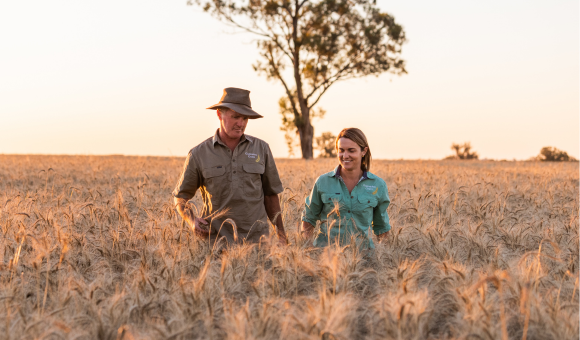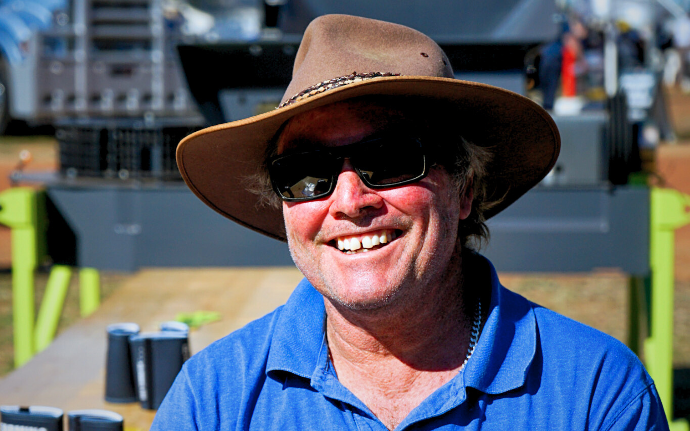WeedSmart
Port Lincoln July '24
Panel Discussion 'Harvest weed seed control - working with mills'
Tom Brown
Location: Beaumont, WA
Crop: 100% crop
Machine: Twin John Deere s680's
“The Seed Terminator will be a part of our operation as long as I stay farming”
01
Why did you add a Terminator to your operation?
When we got out of stock, the weeds started to show up so we knew we needed to use every tool in the box. The great joy as you’re harvesting with a Terminator is seeing those weeds above the crop, if they’re in the seed pods and they haven’t shed and you get them in the machine, you just know they go out as flour.
02
The best thing about harvest now?
I drive my own machine, I observe as I’m harvesting knowing full well the previous year I had a lot of ryegrass, and then the next year I drive through with that machine and I see less and less. The great thing about Terminators is when you’re finished, you just shut the gate, you don’t have to burn no controls, no chafflines to harbour earwigs or snails. Just great. Some areas have reduced down to nothing. I did have some thick spots on some sandy country, we’re just not seeing that anymore. There are one or two plants in the paddock but radish holds onto its seed very well and they just go through the Terminator and out they go as flour.
03
Can you see the difference?
All of us who farm would see some kind of resistance, I certainly see escapees for all sorts of reasons away from the herbicides we spray on the crops before and after seeding, those escapees the last ones, you just don’t want to take any prisoners’ whatsoever, that’s where I see those Seed Terminators sitting on the back of the machine just keeping up with them and making sure any escapees as best as we can do are going through the machines and they go out as flour.
Kim Slarke
It’s just a tool to take the pressure off your chemicals.
We did our first herbicide resistance test in 1994, came up with herbicide resistance, but if you can use mechanical tools then you are putting less pressure on your chemicals, because we all know chemicals work until they don’t.
The management of running one of these as against chaff dumps or windrows, we just harvest a paddock and that paddock is ready to go into crop next year or whatever the rotation is. We just harvest a paddock and that’s it.
All your ryegrass and weed seeds, get them threshed out, get them on your sieves and get them through the Terminator. That’s the go.
Mick Schutz
The first thing I did when we got out in the paddock was grab the old sweep net and get some samples, everyone says they are doing 98% kill but I needed to prove it to myself. It was a game of try and find the ryegrass seed, there were only little shells left, so you know you’re doing a good job.
We started with CTF and chaff decks, we always had it in the back of our mind to eventually go to a mechanical kill. We had a few dry seasons and didn’t get the germination so we started having a lot of ryegrass issues on tramlines and the best way to go forward was to mechanically kill them and harvest with a smile on your face.
As far as wear goes we even leave them running in peas and lentils, we’re using flex fronts with air reels to help us blow all the seeds into the front and straight through the mills. We don’t do any selective grass sprays, no Sakura, no Boxer Gold, it’s just money back in the pocket. We don’t farm for tomorrow, we don’t farm for next week, we farm for the future.
Damien & Carissa Schneider
Location: Culcairn, NSW
Crop: 100% crop
Machine: Case IH 7230 + Shelbourne Reynolds Stripper Front
"The numbers there at knock down time were a lot less than I expected after just one year"

01
Why did you add a Terminator to your operation?
I’m in a higher rainfall zone and of course, with that high production of rainfall, it gives you different troubles and different problems to play with as in the higher weeds. I knew I had to do something significant here. I had already changed a few things, I was chasing different rotations. I’d started growing hay crops in the bad paddocks to try and clean them up. With the higher rainfall it’s a lot more difficult as you’ve got a lot more stubble to deal with, so it’s a lot harder to get your pre-emergent onto the ground to do their jobs especially now I’ve switched to a disc system which narrows my pre-em choices down. So I thought, well, this is one way to help tackle that!
02
The best thing about harvest now?
I’m on a strip disc system now as of last year so getting that ryegrass into the header was a big thing and it changed my whole mindset. I’m not really going to change much in that respect from this year to last year. I probably felt more comfortable I think, knowing that, hopefully, a lot of that went through the header and got smashed up by the Seed Terminator.
03
Can you see the difference?
It’s a numbers game and last year I was really surprised at how clean a lot of these trouble paddocks and trouble patches I’ve got were. The numbers there at knock down time and through the season were a lot less than I expected after just one year. It took the pressure off the pre-emergents, as they’ve only got 10 plants instead of 1000 to try and kill and that brings your numbers down in another way as well.
Duane Jury
We’ve been no till farming for 30 years, we’ve got no stock so we’ve been using different mechanisms to try and control grass, but I can’t control it. I’m just pouring more and more chemical on, I need something else in the toolbox to get to try and kill these weeds. No matter what system you use it will either slow you down or increase your workload, if you want to windrow and burn you have to come back later in the year to do that, if you want to tow a chaff cart that’s more work as well. This does slow us down a smidge but really not too much. I’m running 2 s680’s John Deere’s and the Seed Terminator is using about 15L of fuel per hour. We run it through every crop that we grow and it’s never stopped me.
There’s not too many negatives at the moment – it uses a lot of horsepower, it’s making the machine work hard, it’s hard on belts, it’s using fuel but there’s a compromise there somewhere that for every patch of ryegrass that I’m going through I’m killing ryegrass in my cereal phase in my crop, well, I’m ahead.
Ben Hobley
We don’t need to take a 10-year view to say this is the right move, and it doesn’t matter really now if we’re talking about Terminators specifically or products in that category it’s just that concept is a no brainer now – you have to control those weeds at harvest time or we’ll just all end up in a pretty bad position.
I don’t think where you sit on the resistance curve is that relevant, if you’re in trouble already you’re definitely wanting to try and pull yourself back and if you’re not in trouble you want to do all you can to stay that way. Depending on the herbicide and how often you use it and what your farming systems are, you can potentially lose your herbicide pretty quickly, within a few years.
Tony Buller, Bruce Rock, Western Australia

Real farmers, real life experience with the Seed Terminator
Get honest insights about Seed Terminator from farmers who use it. No sales talk, just real experiences.
